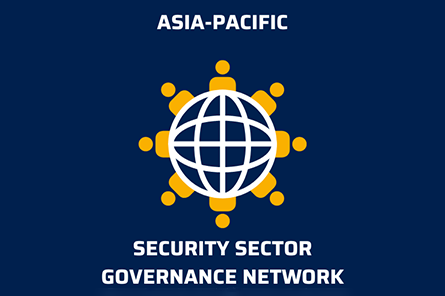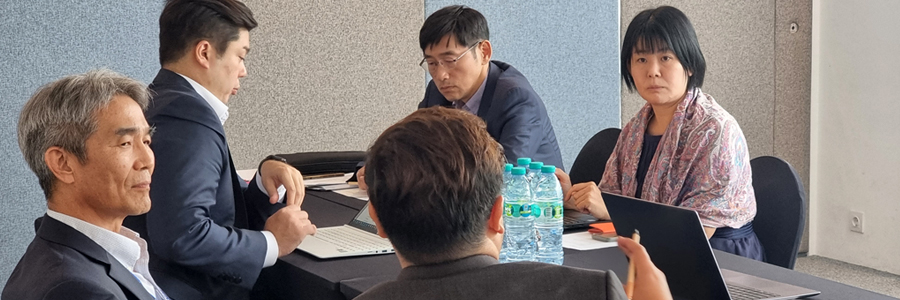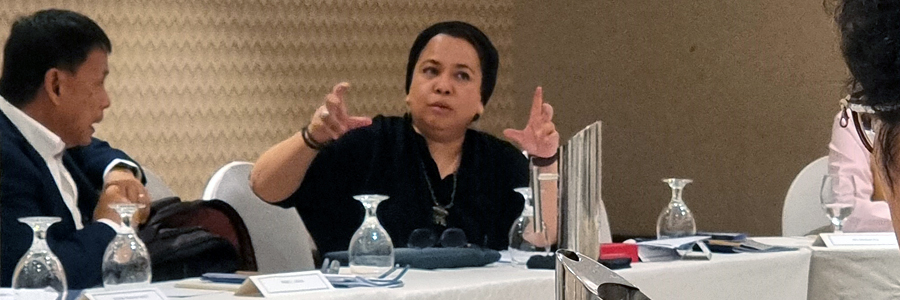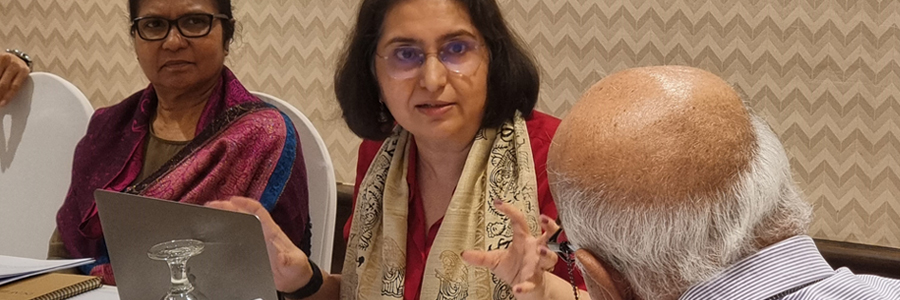Asia-Pacific SSG Network
DCAF has since 2017 created a network to promote good SSG in the Asia-Pacific region, consisting of over 20 partner institutions and SSG Associates (experts working on related issues) for South, Southeast, and East Asia. Partners gather at both the regional and the sub-regional level once a year. There, they exchange experiences in promoting good SSG and identify or discuss activities that can help to improve SSG.
The partners also assemble “national SSG working groups” with security sector representatives and experts. These review the status of SSG in their country and define needs for improvement. DCAF then supports efforts to turn these into SSR activities that can be implemented if funding is found.
Download our factsheet to learn more about our work in Asia-Pacific.

Subregions

DCAF has five partnerships with institutions from East Asia, representing China, Japan, Mongolia, South Korea, and Taiwan. The SSG network thus spans the entire region bar for North Korea. DCAF is working to intensify its presence in the region and is open to project proposals.
Since the first sub-regional SSG forum in Seoul in November 2019, there have been 22 national working group meetings. We are currently working together with five institutions: the Institute for Strategic Studies (ISS) in Mongolia, the Center for Global Security of the National Defense Academy of Japan, the International Policy Studies Institute of Korea (IpsiKor), the Taiwan Studies Centre of National Chengchi University in Taiwan, and the Global Governance Institution (GGI) in China.
Resource:

DCAF has partnerships with institutions and associates from nine countries in Southeast Asia: Brunei, Cambodia, Indonesia, Malaysia, Myanmar, the Philippines, Singapore, Thailand, and Timor-Leste. The network currently does not include Laos and Vietnam, for which DCAF is still looking for partners. DCAF is working to maintain and intensify its presence in the region and is open to project proposals.
Since the first sub-regional SSG forum in Manila in October 2019, there have been 18 national working group meetings. We are currently working together with several associates as well as six institutions: the Indonesia Institute for Defense and Strategic Studies (LESPERSSI), the Ricardo Leong Hub for Global and Area Studies of Ateneo de Manila University in the Philippines, the Myanmar Institute for Peace and Security (MIPS), IMAN Research in Malaysia, Fundasaun Mahein in Timor-Leste, and the GAIA Alliance in Brunei.
Resource:

DCAF has partnerships with institutions and associates in all eight countries in South Asia: Afghanistan, Bangladesh, Bhutan, India, the Maldives, Nepal, Pakistan, and Sri Lanka. DCAF is working to to maintain and intensify its presence in the region and is open to project proposals.
Since the first sub-regional SSG forum in Dhulikhel in September 2019, there have been 23 national working group meetings. We are currently working together with several associates as well as six institutions: the National Centre for Dialogue and Progress (NCDP) in Afghanistan, the Bangladesh Institute of Peace and Security Studies (BIPSS), the Norbuling Rigter College in Bhutan, the United Service Institution of India (USI), the Nepal Centre for Security Governance (NCSG), the Pakistan Institute of International Affairs (PIIA), and the Institute for Monitoring and Evaluation (TiME) in Sri Lanka.
Resource:
About the Inter-Parliamentary Forum on Security Sector Governance in Southeast Asia (IPF-SSG)
Supported by DCAF and FES (Friedrich-Ebert-Stiftung), the Inter-Parliamentary Forum on Security Sector Governance in Southeast Asia (IPF-SSG) was an initiative running from 2006 to 2017 with the goal of supporting the role of parliaments in security sector governance by promoting peer-review and dialogue among parliamentarians and interested stakeholders of the region. IPF-SSG has counted 300 participants, including members of parliament, parliamentary staffers, government and security officials, academic experts and civil society representatives from Cambodia, Indonesia, Malaysia, Myanmar, Philippines, Singapore and Thailand. The Forum featured, among others, regional workshops which address specific issues of parliamentary oversight of the security sector, such as national security policy development, defence budgeting and procurement, police governance and police reform, and judicial reform.
After a decade of lessons learned, DCAF decided to expand a similar approach of knowledge sharing to other actors and to the greater Asia-Pacific region. In 2018, we launched a new project on regional Security Sector Governance Forums. That project is at the core of this website at large.
About the IPF-SSG Secretary-General
Dr. Mario “Mayong” J. Aguja served as the IPF-SSG Secretary-General and is currently a Professor at the Department of Sociology of the Mindanao State University, General Santos City (MSU-GenSan), in the Philippines. He studied AB Sociology at the MSU-GenSan and earned his master’s degree in Sociology at the University of the Philippines, Diliman. He earned a doctorate degree in International Cooperation Studies at the Graduate School of International Development at Nagoya University, Japan. Professor Aguja is one of the founding members of the Akbayan Citizen’s Action Party and was a member of the House of Representatives of the Philippine Congress from 2002-2004 and 2004-2007, which is how he became initially involved in the IPF-SSG. He is additionally actively involved as a short-term consultant on security sector governance in Thailand, Cambodia and Myanmar, and serves as the Vice-Chairperson of the Security Reform Imitative (SRI), Philippines.
Special issues
- "Good Governance of the Security Sector in Southeast Asia: What Role for Parliaments?", A Compilations of Contributions Submitted at the 10th Anniversary Workshop of the IPF-SSG, Siem Reap, Cambodia, 15-16 September 2016.
- Special issue on “Parliamentary Accountability and Security Sector Governance in Southeast Asia, Dialogue and Cooperation, No. 3, 2006".
Briefing Case Studies
Security Sector Reform and Peace Processes
These Country Briefing Notes were written by participants of the 12th IPF-SSG workshop on “Security Sector Reform and Peace Processes in Southeast Asia: What Role for Parliaments” on 22-23 November 2014 in Manila, Philippines.
- Country Briefing Note: Cambodia (2014)
- Country Briefing Note: Indonesia (2014)
- Country Briefing Note: Malaysia (2014)
- Country Briefing Note: Philippines (2014)
- Country Briefing Note: Thailand (2014)
Role of Parliament and Defence Procurement
These Explanatory Background Notes were written in the context of the 5th IPF-SSG workshop on “Defence Procurement in Southeast Asia: Parliamentary Perspectives” on 12-13 October 2008 in Phnom Penh, Cambodia.
- Defence Procurement in Southeast Asia (2008)
- Parliaments and Defence Procurement (2008)
- Explanatory Background Note: Cambodia (2008)
- Explanatory Background Note: Indonesia (2008)
- Explanatory Background Note: Malaysia (2008)
- Explanatory Background Note: Philippines (2008)
- Explanatory Background Note: Singapore (2008)
Role of Parliament and Defence Budgeting
These papers were written in the context of the 4th IPF-SSG workshop on “Defence Budgeting in ASEAN Member States: Parliamentary Perspectives” on 23-24 May 2008 in Phuket, Thailand.
- Defence Budgeting in ASEAN Member States: Parliamentary Perspectives
- Role of Parliament in Defence Budgeting in Cambodia (2008)
- Role of Parliament in Defence Budgeting in Indonesia (2008)
- Role of Parliament in Defence Budgeting in Malaysia (2008)
- Role of Parliament in Defence Budgeting in the Philippines (2008)
- Role of Parliament in Defence Budgeting in Thailand (2008)
Key Resources
Contacts
Albrecht Schnabel, Head of Asia-Pacific Unit (a.schnabel@dcaf.ch)
Kevin Socquet-Clerc, Senior Project Officer, Southeast Asia(k.socquet-clerc@dcaf.ch)
Rohit Karki, Senior Project Officer,South Asia and East Asia (r.karki@dcaf.ch)
Sabeena Bali, Project Officer (s.bali@dcaf.ch)
Floris de Klerk Wolters, Project Officer (f.deklerkwolters@dcaf.ch)





